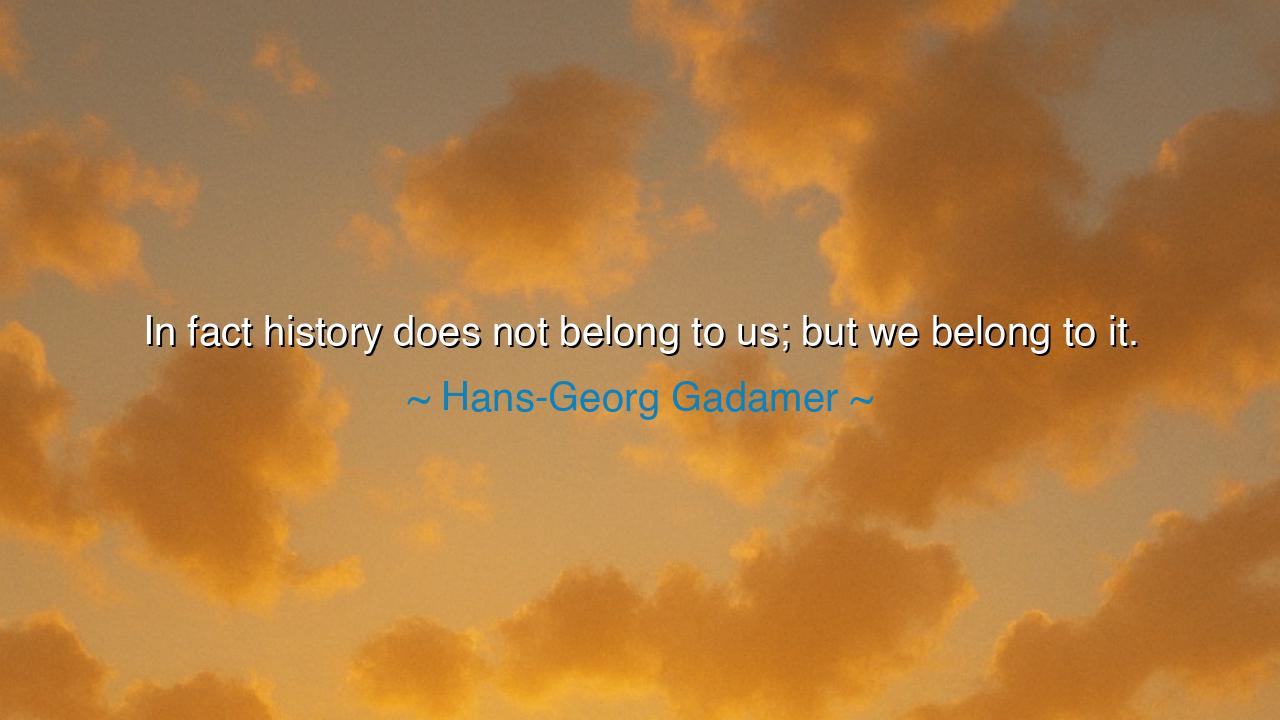
In fact history does not belong to us; but we belong to it.






When Hans-Georg Gadamer, the philosopher of understanding and truth, wrote, “In fact history does not belong to us; but we belong to it,” he spoke with the gravity of one who had peered deeply into the heart of time itself. His words are not simply a meditation on the past — they are a revelation of the bond between humanity and history, an eternal tether that no generation can sever. To Gadamer, history is not a possession to be studied, judged, or controlled; it is the vast living ocean from which we are born and by which we are shaped. We may believe we stand apart from it, that we have advanced beyond the limits of those who came before — but his wisdom reminds us that the past is not behind us; it lives within us.
The origin of this quote comes from Gadamer’s great philosophical work, Truth and Method, where he explored the nature of understanding — how humans come to know truth through dialogue, experience, and tradition. Writing in the shadow of the twentieth century’s upheavals — the wars, the ideologies, the arrogance of progress — Gadamer sought to remind a restless age that no thought, no idea, no self exists in isolation. Every word we speak, every value we hold, is born of centuries of inheritance. To belong to history, he taught, is to recognize that our thoughts are not wholly our own; they are echoes of those who lived before us, whispering still through our language, our culture, our beliefs.
This truth is humbling. For in the arrogance of modern times, men often imagine themselves to be masters of history, reshaping the past to suit their narratives, dismissing old wisdom as obsolete, or pretending that they stand beyond tradition. But Gadamer shatters this illusion. “History does not belong to us,” he says, for we are its continuation, not its owners. Just as a river does not belong to the drop of water that flows within it, so too do we not own the current of time. We are carried by it — shaped by forces unseen, born of ancestors we never met, speaking words whose roots lie in ages long forgotten. To understand this is not to surrender freedom, but to awaken humility — to see that our very being is woven from the tapestry of those who came before.
Consider, for example, the story of Rome, once the heart of an empire and later the cradle of the Western world. Centuries after its fall, its laws, its architecture, and its ideas still pulse through our civilizations. The Roman concept of justice lives in our courts; its roads became the arteries of Europe; its language, Latin, gave birth to tongues that still speak across continents. None alive today laid those stones or carved those words — yet they define us. The modern world may boast of its independence, yet beneath its surface flows the inheritance of Rome, as surely as blood flows from heart to limb. This is Gadamer’s truth made visible: that history possesses us, shaping our minds and our world, even as we pretend to stand above it.
But Gadamer’s wisdom is not merely a lament; it is also an invitation. To belong to history is not to be imprisoned by it — it is to become a participant in its living dialogue. For history is not static; it breathes through us, changing with each generation’s interpretation. The ancients spoke of tradition not as a chain, but as a fire — something to be passed, not preserved in ashes. Thus, to belong to history is to bear its flame forward, to understand what has been given to us, refine it, and offer it anew. We honor the past not by worshiping it, but by letting it speak — by listening to its wisdom while adding our own.
In this way, Gadamer’s teaching calls us to a kind of historical awareness — a deep consciousness of continuity. The reckless man says, “I make myself.” The wise man knows, “I am made by many.” To act without regard for history is to act without understanding; to know oneself without knowing one’s heritage is to walk in darkness. Thus, we must learn to engage the past — to read its texts, to hear its voices, to face its mistakes — not as archaeologists, but as heirs seeking counsel from their forebears. For the past does not sleep; it watches us, waiting to see what we will do with its gifts.
So, O listener of time and seeker of meaning, take this truth into your heart: you belong to history. Every breath you take carries the weight of those who breathed before you; every idea you hold rests upon foundations laid by countless unseen hands. Remember this, and live with gratitude. Study the words of the old not as relics, but as companions; let your actions be informed by both memory and hope. For only when we honor the continuity of history — its sorrow and its splendor alike — can we shape a future worthy of the human story.
And in this lies the final wisdom of Gadamer’s words: to belong to history is not a burden, but a blessing. It is to know that we are not alone — that every step we take is part of an unbroken journey across the ages. The task of each generation, then, is to walk this path with humility, to listen to the echoes of the past, and to add to the song of time a verse of its own, so that those who come after us may know — not that history belonged to us, but that we belonged faithfully to it.






AAdministratorAdministrator
Welcome, honored guests. Please leave a comment, we will respond soon